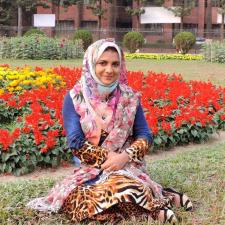Rehana Noor
|
Alumna Position Company Graduated Faculty Degree Date of the interview |
 |
You earned a degree in Sustainable Agriculture from Rhine-Waal University of Applied Sciences. What motivated you to study in Kleve?
I was fortunate to attend an incredibly diverse agriculture university in Bangladesh in Mymensingh, where my friends represented different races, religions, socio-economic status, senses of humour and allegiances to international universities for research work. I wanted a university where I could continue to meet a wide variety of exciting people and Rhine Waal University fit the best. There is a credit transfer facility from Bangladesh Agriculture University to Rhine-Waal for bachelor programmes. They selected only three students in the year I got admitted. I was lucky enough to be selected for the opportunity to study in Europe.
What did you enjoy most about your bachelor’s programme?
I enjoyed crop physiology and nutrition, international markets, trade and agriculture policy, traceability of agriculture products and my internship abroad a lot. Those courses (and our professors) helped me understand how agriculture plays an important role in monitoring nature, adding value to human nutrition and the global market, and maintaining the economic resilience and social harmony of a community.
After graduation, you continued your studies with a master’s degree in Agronomy at Sher-e-Bangla Agriculture University in Bangladesh. Since March 2016, you have been working at Grameen Intel Social Business Limited as an agriculture specialist in Dhaka. Can you tell us a little more about the company’s mission and your role within the company?
Grameen Intel Social Business Limited is an information technology company formed as a joint collaboration between Intel Corporation and Grameen Trust. They provide IT solutions for rural entrepreneurs who provide a service using computing technology in their local communities. The mission of the company is to solve social problems with information technology at affordable prices, develop software that runs on a low-cost computing device, create solutions for a network of entrepreneurs providing agricultural or healthcare-related services and enhance strategies for connecting the unconnected population segment with information services. I work here in the agriculture department and I am their core agriculture specialist responsible for agriculture-related research. I manage their four agricultural applications: seed, fertilizer recommendations, pest and disease management, and agricultural marketing. I am also actively involved in the development of digital soil testing kit, using my soil nutrient analysis expertise in the calibration process. In addition, I am also responsible for liaison maintenance with different stakeholders, mostly with government organizations. I have been enjoying this particular role very much since it adds a new communication-based dimension to my career.
What are your favourite work tasks?
I spent a lot of time on soil nutrient analysis and crop nutrition so I enjoy this task. More importantly, I enjoy incorporating different ideas into GISB’s agriculture applications that leverage these ICT tools for rural livelihood development. I also enjoy the liaison maintenance with different stakeholders at my current job.
Which important skills for this position did you acquire because of your studies?
Here at GISB, I take care of different modules such as seed, fertilizer, pest and disease management, agriculture market linkage, nutrient analysis and stakeholder management, which is only possible because of my multidisciplinary research engagement during my studies. Earning a degree in sustainable agriculture focused on three key points -- environment, economic and social resilience -- helped me to understand the vision of a social business dealing with precision agriculture like at GISB. In addition, the master’s degree in Agronomy, which is referred to as the “mother of agricultural science”, helped me to deal with different agronomic aspects, including soil management and seed science. Overall, my study programme offered the perfect blend to prepare me for this job so that I can confidently manage such a diversified role.
What would you recommend to our students who want to best prepare themselves for a career after graduation?
Start working. I believe the millennial generation wants meaningful work. Then we come face-to-face with available jobs where the meaning is unclear or our impact seems marginal. If you know that the next step is out there, go for it full steam. I reached out to available resources for career support, I sought counsel and spent time reflecting on my values and interests to set a course aligned with my personal vision. Find people and settings that will cultivate your talents and move you toward your goals. Whatever job you want to do, the only way to master it is through practice. Be inquisitive about what you want to do for a living and then pursue it. Our professors truly care about us, not just about our education, but also our futures and overall well-being. You can even make lifelong friends with some of our professors! So really listen to what they teach you in and out of the classroom.
When I think back to my time as a student at Rhine-Waal University, I remember…
…the time I spent in the tropical greenhouse for my thesis, the library, the riverside, meeting friends at the cafeteria and, most importantly, the memory of summer school at Wageningen University. I was one of 30 students in Agriculture universities in North Rhine-Westphalia who were selected for this summer school. The summer school was a very significant trip for me. I got the chance to meet with different nationalities and professors in the field of molecular breeding and this trip helped me to manage my subsequent internship at Wageningen. Finally, there were many good memories with Professor Wichern whom I will always cherish in my heart as one of my best mentors in academic life. He always inspired me to take the challenging decision and explore the different areas of agriculture, which nowadays helps me to diversify my career interests and easily cope with any situation.
